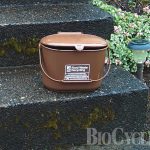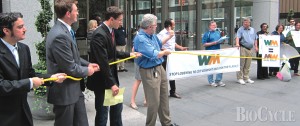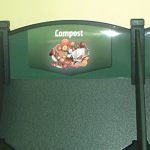BioCycle June 2012, Vol. 53, No. 6, p. 10
Tacoma, Washington: Expanded Curbside Organics Program
Beginning in April 2012, Tacoma expanded its curbside yard trimmings program to accept all types of food scraps. Nearly 54,000 single family and duplex residences are serviced by the City of Tacoma’s municipal solid waste services, and an estimated one-third of what they throw away is food. This amounted to more than 14,000 tons, according to a 2009 waste characterization study. Although residents had been able to include small amounts of fruits and vegetables since 1995, other types of food were excluded. Also, the inclusion of food was not actively promoted. Now all solid foods, including meat, fish, dairy, shells and more, can be added to the curbside yard trimmings cart. To make it easy to participate, the city provided households with “little brown buckets” for collecting kitchen scraps. The smaller collection buckets (made by Orbis) are color–coordinated to match the “big brown” curbside containers and help standardize the home system and practices.One week before receiving their buckets, residents learned through a special mailer — as well as through ads, articles and programs in local news and social media — that the buckets would be arriving. They contained an instructional flyer with tips on how to collect and recycle food scraps. Residents can watch informational videos on the city’s website, www.tacomarecycles.org. Ongoing promotion includes colorful signage on the yard trimmings collection trucks that feature slogans such as “Crust is a must – food waste recycling!”
Yard trimmings and food scraps collected in Tacoma are processed at the Compost Factory in Puyallup, Washington, owned and operated by Waste Connections. The city is working to make bagged compost available for purchase alongside TAGRO, its well-received Class A biosolids product made by Tacoma’s wastewater treatment plant. With an estimated population of 198,000, the city is committed to reducing the amount of waste it sends to disposal and is exploring its best options for managing the organic waste stream, explains Jetta Antonakos, program leader and City of Tacoma Solid Waste Management Senior Environmental Specialist. This could include any number or combination of options such as building its own composting facility or taking advantage of anaerobic digestion opportunities at its central treatment plant.
Mecklenburg County, North Carolina: Piloting Curbside Food Collection
To better understand the quantities, distribution, markets and infrastructure for food waste diversion in the commercial and residential sectors of Mecklenburg County, officials hired Kessler Consulting, Inc. (KCI) based in Tampa, Florida, to prepare a comprehensive report. The goal was to establish the baseline information necessary for evaluating the feasibility of a future food waste recovery pilot program. “Mecklenburg County has taken a sound approach to the benchmarking of what’s happening with food waste and composting in their community,” says Miriam Zimms, a senior consultant with Kessler. “The study has given them an idea, both in the commercial and residential sector, of how much is generated and how much is being diverted.” The study looked at such variables as backyard composting, food donations, composting infrastructure, marketing and education. “It allowed them to see where the gaps and opportunities are before they decide to roll that out.” The study’s recommendation is to conduct a pilot.
“I don’t think there were any surprises,” says Mecklenburg County Environmental Manager Laurette Hall. “We were open to finding out exactly what was going on in the county, where waste was sitting and how much of it there was. It was enlightening.” Major clusters for food waste generation in the commercial sector were identified, she adds. “We’ve had several companies coming to us looking to capture food waste from the commercial waste stream.” Those companies, some with various organics-waste-to-energy projects either under way or being considered and others looking to contract to haul organics to such projects, had done their homework Hall notes, stating that the study was commissioned in large part to have a source of information for dealing with these requests and need for additional information. “Now we’re providing that information to the potential service providers.”
Houston, Texas: Waste Management Blasted For Greenwashing
Taking Waste Management (WM) to task outside the company’s annual shareholders meeting for alleged greenwashing, a group of protesters — including members of the Texas Campaign for the Environment (TCE) and the International Brotherhood of Teamsters — staged a mock press conference, displayed protest signs and chastised the company for attempting to overturn bans on disposing yard trimmings in landfills while touting itself as a champion of the environment. “WM: Stop lobbying to cut compost and cook the planet,” implored a printed banner as a staged tug of war over a bag of compost ensued between protesters dressed as corporate executives on one side and home gardeners on the other. “Waste Management is attempting to have it both ways, looking like a ‘green company’ while continuing to landfill yard trimmings for profits,” said Tyson Sowell, Houston Program Director for TCE, referring to WM’s Think Green Campaign concurrent with its successful yard trimmings ban repeal lobbying in Florida and Georgia and under way in Michigan. “Yard trimmings do not belong in landfills. They should be used to replenish our degrading soils.”TCE Executive Director Robin Schneider managed to attend the board meeting as a proxy and reported that the mood was “tense and restless,” with some in attendance getting out of the chairs during the meeting to catch a glimpse of the protestors in plain view on the street level two floors below. “I think they understand, loud and clear, that touting themselves as the leader in composting and recycling while lobbying to dismantle yard trimmings landfill bans in other states is unacceptable and we will hold them accountable,” said Sowell.
Barnesville, Georgia: Yard Waste Ban Repeal Impacts
With the rescinding of longstanding bans on yard trimmings disposal in landfills in Florida and Georgia in 2011 and the debate over similar legislation heating up like a well-tended compost pile in Michigan, BioCycle checked in with organics recyclers and their proponents in the states with bans to see what effects, if any, the new policies were having on organics recyclers. “It hasn’t really negatively impacted us at this point,” says Melia Lesko of Greenco Environmental in Barnesville, Georgia, adding it is probably due to the fact that when the ban was repealed (only for landfills with methane gas capture systems), the new legislation contained a clause allowing counties and municipalities to enact whatever policy they saw fit within their jurisdiction. For the most part, says Lesko, whose facility processes about 65 tons/day of food waste along with yard trimmings, it has been status quo.
Something that’s difficult to measure, she notes, is whether the ban has negatively impacted potential growth in the composting industry by discouraging new projects in regions where disposing of yard trimmings in landfills is now convenient, inexpensive and allowed. “It could be a significant problem for future growth of the industry,” says Lesko, also citing what could happen as local agencies face even tighter budgets. “It’s really all about collection, in our minds,” and whether it’s easier and cheaper to move yard trimmings to disposal over composting. “But there are only 10 landfills in the whole state of Georgia that even qualify [to dispose the yard trimmings].”
Cincinnati, Ohio: Green Business Council Promotes Composting
Several large, Cincinnati-based corporations including Procter & Gamble (P&G), Kroger, Macy’s, Mitsubishi Electric Automotive America, Melink Corporation and Fifth Third Bank are part of a local initiative to promote sustainability in the workplace. The companies belong to the Greater Cincinnati Green Business Council (GCGBG), which started a waste reduction program by distributing workplace compost kits among members and other companies in the region. P&G is building on a year-old initiative to divert recycled materials and compostables from local landfills. The program began at its Mason Business Center last summer and was added at its downtown headquarters in January. Food waste from company cafeterias that serve 6,000 employees is collected and hauled to local farms for composting. In its first four months, the project diverted 37.5 tons of food waste. The total should reach 130 to 150 tons/year, according to Larry Bridge, a P&G facilities manager.Recycling centers in employee cafeterias have three separate bins — single-stream recycling, compost and landfill. The “compost” bin captures all food scraps including meat, cheese, fish, bones, fruits, vegetables and disposable take-out containers. “Most of our take-out containers are now compostable or biodegradable, such as paper salad bowls and sandwich wraps,” Bridge notes. Cleaning crews use compostable bags to carry materials to on-site dumpsters, which are emptied twice a week by Future Organics Inc., a Dayton-based firm that hauls the organics to Brausch Farms in Morrow, Ohio, and Marvin’s Organic Gardens in Lebanon, Ohio. Brausch Farms receives about 50 to 60 tons of material daily from P&G, Kroger, Walmart and area schools, according to owner David Brausch. He blends the food waste with “horse muck” (hay, horse manure and urine) to make compost for his 1,200 acres of wheat, corn and soybeans.
Guatemala City, Guatemala: A Tweeting Alliance
When Canadian vermicomposting specialist Cathy Nesbitt of Cathy’s Crawly Composters began Tweeting to share compost information, she didn’t expect her networking to take her to Central America. Maria Rodriguez is executive director of a large worm farm (www.byoearth.com) that sells fertilizer to nonprofit organizations for subsistence farmers. As she and Nesbitt became Internet friends, both were keen to promote an alliance. Rodriguez wished to learn more about Nesbitt’s social media, packaging and marketing techniques. To Nesbitt’s astonishment, she received an invitation to help set up vermicomposting projects in Guatemala. “It was an opportunity, I couldn’t refuse,” says Nesbitt. “Together we worked with two women’s groups living around the dump in Guatemala City where we conducted sessions to describe vermicomposting from set-up to harvesting the castings.” One group set up in plastic vermicomposting bins on a rooftop. “We were able to share our passion and experience,” adds Nesbitt. “As well as learning a bit of Spanish, I returned home enriched with incredible knowledge about this wonderfully friendly and colorful culture’s relationship with composting.”
Madison, Wisconsin: Stricter Limits On Landfill Gas Emissions Urged
In a 9-page letter, the Center for a Competitive Waste Industry (CCWI) based in Madison, Wisconsin today urged the US EPA’s Science Advisory Board to reject requests by Waste Management and others to ignore carbon dioxide (CO2) emissions from landfills when later setting greenhouse gas (GHG) limits, and, most important, to recommend that strict limits be placed on landfill gas emissions. EPA is expected to set GHG limits soon under its GHG Tailoring Rule, restricting limits to the largest emitters. Under the 1990 Clean Air Act, the strictest Maximum Available Control Technology rules (MACT) were required for landfills, but, says CCWI Director Peter Anderson, EPA “flouted the law in order to make landfilling artificially appear cheaper than recycling.” Furthermore, Anderson states that the nonhazardous air rules, which exempted 95 percent of the landfills, let the operator “design their own gas collection systems [in order] to provide flexibility. These near-voluntary codes accomplished little more than the waste industry would have been forced if there were no regulations. … Most important for EPA’s GHG Tailoring Rule is whether any meaningful requirements will be imposed on landfills to capture the methane produced as buried food and wood scraps, yard trimmings and textiles rot in landfills.” For more information: Peter Anderson (608) 444-2817, anderson@competitivewaste.org.













